Matt Rees's Blog - Posts Tagged "fiction"
"Mystery fiction not limited by form, highly instructive"
People who don't know any better sometimes tell me that I'm a good writer and they'd like to see me write a "real novel," instead of my Palestinian crime novels. Usually I tell them Raymond Chandler once wrote that there are just as many bad "real" literary novels written as bad mysteries -- but the bad literary novels just don't get published. Now I'll be able to add something else to my always polite correction of this misconception about crime novels. That's because of a review of my new Palestinian crime novel THE SAMARITAN'S SECRET in the Feb. 7 issue of The Tablet, a British magazine published for the Roman Catholic community. The Tablet makes THE SAMARITAN'S SECRET "Novel of the Week" and reviewer Anthony Lejeune writes that it's "a novel thick with atmosphere, memorable, unusual and the clearest possible proof that mystery fiction can be moulded into any literary form and is often highly instructive."
Live at the Leipzig Book Festival!
On my recent tour of Germany, I was interviewed (in English) on the 3Sat tv channel's stage at the Leipzig Book Fair. Of the big Germany book festivals, this is the one that gives the most time to readers and authors (the biggest, Frankfurt, is mainly for publishers to get a little more than tipsy together -- oh and to do some deals, of course). I was interviewed by a lovely, knowledgable German journalist named Tina Mendelsohn about my second Palestinian crime novel A Grave in Gaza, which is just out in German and proving very successful there. It was a bit of a demanding situation to maintain concentration, with thousands of people wandering by me only a few yards away -- many of them dressed rather disconcertingly as Japanese cartoon characters...But it was fun, too.
The Guardian: 5 Foreign Sleuths to Read
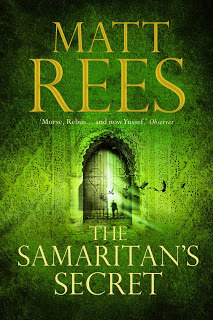
The Guardian recently ran an interesting article seeking to explain the popularity of crime novels set in "exotic" locations -- either written by locals or by foreigners living there. The article makes a few worthwhile points about the basics of this new-ish sub-genre. It also includes a list of the top five such "foreign" sleuths recommended by the newspaper:
Inspector Chen -- from the novels of Qiu Xialong
Dr Siri -- Colin Cotterill
Precious Ramotswe -- Alexander McCall Smith
Yashim Togalu -- Jason Goodwin
and, of course,
my own Omar Yussef, the Bethlehem schoolteacher who's forced into detective work by the lawlessness of Palestine.
Crime Always Pays, Punk
One of my favourite blogs is Declan Burke's excellent Crime Always Pays, which does for Irish crime fiction what the famous toucan does for Guinness. As a Welsh crime writer, I assume I'm the next best thing to an Irish crime writer, so Declan includes me today in his long-running interview series "Ya Wanna Do It Here or Down the Station, Punk." Find out what I'd want in return for strangling puppies and biting the heads off chickens....
Fiction more real than journalism
I wrote a guest post for A Book Blogger's Diary this week. The post, headlined "Fiction more real than journalism," explains why I turned from journalism about the Middle East to fiction, as a better way of explaining the profound things I had learned in more than a decade here in Jerusalem.
The Wanderlust and Words blog has a post about how my writing, in particular my second novel A Grave in Gaza, has channeled my traumatic experiences as a war correspondent and placed them on the page in the form of shocking moments for my characters.
Murder by the Book Mystery Bookstore blogs about my first novel The Collaborator of Bethlehem, which it calls "a thought-provoking, very different look at a community in crisis."
The Wanderlust and Words blog has a post about how my writing, in particular my second novel A Grave in Gaza, has channeled my traumatic experiences as a war correspondent and placed them on the page in the form of shocking moments for my characters.
Murder by the Book Mystery Bookstore blogs about my first novel The Collaborator of Bethlehem, which it calls "a thought-provoking, very different look at a community in crisis."
Krimis, polars, gialli: what crime novels are called around the world
Sometimes people talk about crime novels as though they were all the same. The sheer number of different names for variants of the crime novel proves that isn’t true.
Police procedural. Mystery novel. Thriller. Cosy. Exotic detective. Supernatural. I used to think there was little real difference, but then my UK publisher told me he wanted to change the title of my first novel “The Collaborator of Bethlehem.” He thought it sounded like a thriller (which men typically buy) and he wanted it to be clear that it was a mystery (so that women would buy it.) He changed the title in Britain to “The Bethlehem Murders.” I had to acknowledge that he was right: it sounds more like a mystery, doesn’t it.
And that’s only in English.
As I travel around to promote my books in different countries (I’m published in 22 countries these days), I’ve noticed that there are interesting variations on the names we use in English for crime novels. Some of them are quite entertaining, and some of them tell us something revealing about how the genre developed in that country.
Take Italy. Mystery novels there are called “gialli,” or yellows. That’s because traditionally the genre was published with a yellow cover. Even today the mystery shelves of Italian bookshops are largely yellow.
Color is the theme also in Spain, where crime novels are “novelas negras,” black novels. According to a source of mine on the literary desk of El Pais, the big Spanish newspaper, this harks back to the old “Serie noire” of French publisher Gallimard. That series introduced the crime novel to Spain. So noir, or black, became the identifying color for a crime novel.
A “roman noir,” black novel, is also one of the ways of referring to a crime novel in France, because of that Gallimard series. But the most common slang for a mystery in French is “un polar.” It’s a contraction of “roman policier,” police novel, and was first recorded in 1968. If you ask most French people to explain the origin of the word “polar,” they can’t tell you: the abbreviation has become so common, they’ve forgotten its rather simple derivation.
Germany (as well as the Scandinavian countries) calls a crime novel “ein Krimi,” short for the word Kriminelle, criminal. No surprise there. It’s a catch-all for thrillers and detective stories of all kinds.
There is, however, an amusing sub-genre in German. In English, the “cosy” refers to Miss Marple-type novels in which the detective is an amateur, usually a lady (not just a woman), probably an inhabitant of a quaint village, investigating a murder in a country house or a vicarage.
The Germans call these cosies “Häkel-Krimis“. Miriam Froitzheim, who works at my German publisher C.H. Beck Verlag in Munich, translates this as “Crochet Crime Novels.” Because, as she puts it, the detective “puts her crochet gear away to solve the murder.”
I’ll keep scouting for interesting ways of describing crime novels around the world. But if you know of some others, tell me about them.
Police procedural. Mystery novel. Thriller. Cosy. Exotic detective. Supernatural. I used to think there was little real difference, but then my UK publisher told me he wanted to change the title of my first novel “The Collaborator of Bethlehem.” He thought it sounded like a thriller (which men typically buy) and he wanted it to be clear that it was a mystery (so that women would buy it.) He changed the title in Britain to “The Bethlehem Murders.” I had to acknowledge that he was right: it sounds more like a mystery, doesn’t it.
And that’s only in English.
As I travel around to promote my books in different countries (I’m published in 22 countries these days), I’ve noticed that there are interesting variations on the names we use in English for crime novels. Some of them are quite entertaining, and some of them tell us something revealing about how the genre developed in that country.
Take Italy. Mystery novels there are called “gialli,” or yellows. That’s because traditionally the genre was published with a yellow cover. Even today the mystery shelves of Italian bookshops are largely yellow.
Color is the theme also in Spain, where crime novels are “novelas negras,” black novels. According to a source of mine on the literary desk of El Pais, the big Spanish newspaper, this harks back to the old “Serie noire” of French publisher Gallimard. That series introduced the crime novel to Spain. So noir, or black, became the identifying color for a crime novel.
A “roman noir,” black novel, is also one of the ways of referring to a crime novel in France, because of that Gallimard series. But the most common slang for a mystery in French is “un polar.” It’s a contraction of “roman policier,” police novel, and was first recorded in 1968. If you ask most French people to explain the origin of the word “polar,” they can’t tell you: the abbreviation has become so common, they’ve forgotten its rather simple derivation.
Germany (as well as the Scandinavian countries) calls a crime novel “ein Krimi,” short for the word Kriminelle, criminal. No surprise there. It’s a catch-all for thrillers and detective stories of all kinds.
There is, however, an amusing sub-genre in German. In English, the “cosy” refers to Miss Marple-type novels in which the detective is an amateur, usually a lady (not just a woman), probably an inhabitant of a quaint village, investigating a murder in a country house or a vicarage.
The Germans call these cosies “Häkel-Krimis“. Miriam Froitzheim, who works at my German publisher C.H. Beck Verlag in Munich, translates this as “Crochet Crime Novels.” Because, as she puts it, the detective “puts her crochet gear away to solve the murder.”
I’ll keep scouting for interesting ways of describing crime novels around the world. But if you know of some others, tell me about them.
Review: Haitian scandal, voodoo and family obsession with Cara Black
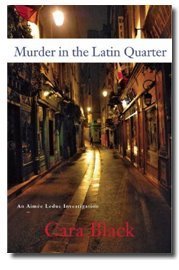
Murder in the Latin Quarter
by Cara Black
Soho Crime, isbn 1569475415
Just when our detective is set to get down to some normal, profitable work, a woman walks into her office with a story that sets our mystery on a personal track. It’s a tested opening for a detective novel, but Cara Black’s version of it has an originality and freshness that works well. The detective is Aimée Leduc, a Parisian computer-security expert, and the mystery woman is an illegal Haitian immigrant who claims to be Leduc’s half-sister. On her first attempt to get more details from the supposed sister, Leduc discovers the murdered body of a Haitian scientist and realizes that the newcomer may be involved in something more than family genealogy.
The ninth episode in Black’s series of Paris detective novels takes Leduc through a plot involving voodoo, corrupt businessmen, and scandal in Haiti. But it remains rooted in the streets of Paris. Leduc ends up crawling through windows and tunnels, covered in the muck of the City of Light. It’s a good image for the way Black keeps the novels grounded there. Paris may be everyone’s idea of a romantic city, but to those who know it it’s also a place of “diversity”—a nice modern way of saying that there are many awful inequities. “Murder in the Latin Quarter” is a fine way to slap some reality onto those vacation memories and to get a picture of the varied life in the French capital.
As an episode in a lengthy series of novels, there are also intriguing developments in Leduc’s obsession with family--her radical mother abandoned her as a girl, and her policeman father was murdered, so it’s easy to see why she ponders the issue a lot. The possible blood connection to the Haitian woman drives Leduc through the dangers of the book, and by the end it’s clear that the same urge will be eating at her until the welcome arrival of the next novel by Cara Black.
The Writing Life: Evan Fallenberg
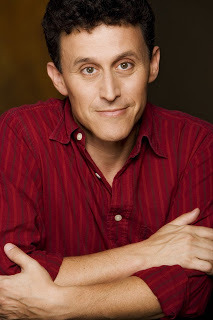
The most stirring, dramatic novel I’ve read in many years is Light Fell by Evan Fallenberg. It’s the story of Joseph Licht, an Israeli family man who falls in love with his rabbi. At first it looks like it might be the tale of their forbidden romance, but the book takes a startling turn and Licht is forced to face the religious beliefs, prejudices, and resentments of his sons. Light Fell has won or been shortlisted for: the Barbara Gittings Stonewall Award; a National Jewish Book Award; the Edmund White Award; and a Lambda Literary Award. Fallenberg's also one of the leading translators of Hebrew literature, including Batya Gur's Murder in Jerusalem, Alon Hilu's Death of a Monk, and Meir Shalev's A Pigeon and a Boy, winner of the 2007 National Jewish Book Award for fiction and a finalist for the PEN Translation Prize. A proud native of Cleveland, Ohio, Evan lives in a rural community near Netanya, Israel, where he runs a writing school in his back yard. I wish you could hear him read from his work, because he’s a compelling, engaging presence—go and hear him if you get a chance. Meanwhile, here are his fascinating thoughts on writing.
How long did it take you to get published?
That was a long, protracted process that would look like a mountain range if it were mapped out. Several years, really.
Would you recommend any books on writing?
For teaching I mostly rely on Writing Fiction by Janet Burroway; Creating Fiction, edited by Julie Checkoway; Pat Schneider's Writing Alone and with Others; and What If? by Pam Painter and Anne Bernays. As a writer I've been enriched by writing books penned by Jane Smiley, Francine Prose, and especially Ben Yagoda (The Sound on the Page) and, the best of them all, EM Forster's Aspects of a Novel.
What’s a typical writing day?
I only learned what my typical writing day was a few years ago, when I was a guest artist at the MacDowell Colony and my days were entirely my own. Until then it had simply been a matter of finding an hour when no spouse, boss, child or chore needed me. But when able to choose, I like to rise early, write a scene or two, eat a hearty breakfast, take a mid-morning nap, and settle down to work again for a long stretch from noon until dinner.
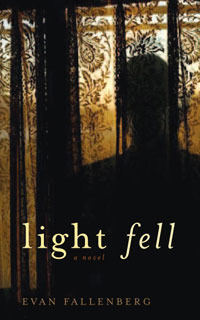
Plug your latest book. What’s it about? Why’s it so great?
Light Fell is the story of Joseph Licht, an Israeli who in 1976 leaves a life of certainties (wife, children, religion, a position in society and academia) for a great and forbidden love with a dynamic young Orthodox rabbi. Since it's impossible to offer credible, objective (!) feedback on one's own book, I'll quote the judges of the American Library Association's Barbara Giddings Stonewall Award, who awarded their fiction prize to Light Fell this year: "With rich characterization and eloquent writing Fallenberg explores the inner lives of a family and the universal applicability of the social and religious issues they face." For me as a reader, books need to have engaging characters of depth taking part in a gripping story that I can relate to no matter how different my life is to theirs, and written in language that is at the same time rich, precise and unselfconscious. The judges' comment makes me feel as though I have succeeded in writing book that even I would like to read!
How much of what you do is dictated by a genre?
I certainly don't fit into any genre that I know of. Writing, for me, feels like reinventing the wheel every time. But I wouldn't want it any other way. After all, if you are just writing an altered version of what someone else has already done, why bother?
What’s your favorite sentence in all literature, and why?
The closing lines of a poem by the Mexican poet Amado Nervo:
Amé, fuí amado, el sol acarició mi faz.
¡Vida, nada me debes! ¡Vida, estamos en paz!
(I loved, I was loved, the sun stroked my face.
Life, you owe me nothing! Life, we are at peace!)
I learned this poem by heart when I was twelve or so. Back then it was just a jumble of pretty words in Spanish. But it has come to feel like a motto for life, one I believe in every day and hope to do so to my very last.
What’s the best descriptive image in all literature?
There is certainly no one best descriptive image, but the one that jumps to mind (and does so quite often) is from Carson McCullers' short story The Sojourner, which made a huge impression on me many many years ago: "Fair Elizabeth, rosy and naked before her bath. Half-dressed before the mirror of her dressing table, brushing her fine, chestnut hair. Sweet, casual intimacy, the soft-fleshed loveliness indisputably possessed." It's that 'soft-fleshed loveliness indisputably possessed' that gets me every time.
Who’s the greatest plotter currently writing?
Probably Lionel Shriver, an American-born writer living for many years in London. Her book The Post-Birthday World is a masterpiece. Every time she took me to a new plateau I thought I'd reached the summit, but there was always more.
Who’s the greatest stylist currently writing?
I'll go with British writer Michael Frayn, since he is capable of brilliance in every genre he tries: theater, nonfiction, novels.
How much research is involved in each of your books?
The research is great fun, and I could get carried away with it. The book I'm working on now 'required' me to travel to Warsaw, Copenhagen and Berlin AND take ballet lessons. Maybe my next book should involve a Tahitian beach, somehow.
What’s your experience with being translated?
In my case, the question should read "What's your experience with translating?" since that is my vocation. I've had the privilege and pleasure of translating some very fine Israeli writers, including Meir Shalev, Ron Leshem, Batya Gur, Alon Hilu… Every book is an act of ventriloquism, trying to find a voice that isn't your own but isn't exactly the writer's either, since you're rendering this voice in a new language (and culture). My goal is to provoke the same reactions in the English reader that the Hebrew reader would have experienced when reading the original. But the art of translation is imperfect from the outset. The biggest compliment for me came from a reader of my translation of Meir Shalev's A Pigeon and a Boy, who told me she felt as though Meir Shalev had actually written this book in English.
Do you live entirely off your writing? How many books did you write before could make a living at it?
At this point I could only live off my writing by building a tent out of book covers and eating all the pages. But I do actually make my living from a mix of writing, translating and teaching creative writing. So I live off words, that's for sure.
How many books did you write before you were published?
I'm one for one. Nothing in my drawers!
What’s the strangest thing that happened to you on a book tour?
Between two speaking engagements in my native Ohio I was to be interviewed by the local affiliate of National Public Radio. They needed me to be on a landline just when I had planned to visit my sister at the restaurant she owns, but the only quiet place was her office, which doubles as a storeroom. I stood there among huge cans of tomato sauce trying to sound cool and intelligent while the fax machine kept ringing and employees banged at the door looking for waffle batter.
What’s your weirdest idea for a book you’ll never get to publish?
I have a dream of collaborating with a composer-friend on a novella set to music, a sort of mini-opera in four voices. I'm hoping it's just crazy enough to happen.
Review: Red Hot Hurwitz
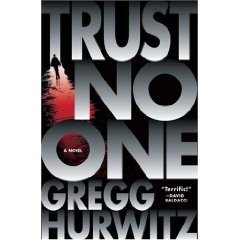
Trust No One by Gregg Hurwitz
St. Martin’s Press. To be published 23 June
The key to a first-rate thriller is for the main character to come up against a dead end many times during the book. The reader, knowing the forces arrayed against our hero and desperate to save him from more danger, each time wills him to use this excuse to abandon his quest. Of course, readers wouldn’t care at these turning points if the hero wasn’t a well-formed character whose humanity has drawn us to him, and that’s the other important element in the genre. Naturally the hero doesn’t quit, and our author takes us into the last segment of the book where the plot unravels and the twists snap us upright in our chairs.
Gregg Hurwitz fulfills all these criteria with real style in “Trust No One,” his new novel. It’d be worth reading if only for the startling denouement in which the hero battles against powerful forces – the Secret Service among others. But the drive of the book comes from the scars of his destroyed family. By the end of the book Hurwitz has tied a message of redemption into the fast-paced action.
"Trust No One" begins with Nick Horrigan catapulted out of the quiet life he’s lived for years. His stepfather, a Secret Service agent, was killed when Nick was a teen. Nick blames himself. As part of a cover-up, he was forced by other agents to go on the run. He’s been lonely and guilt-ridden for a decade. Now the Secret Service arrives through his window… and he’s not lonely any more.
A man threatening to blow up a California nuclear facility hands a key to Horrigan before he dies. As Horrigan tries to figure out what the key is for and why the man gave it to him, he’s drawn into a mystery that leads right back to his stepfather’s killing and into the upper echelons of the US political system.
Readers might detect an element of the “family at risk” sub-genre that Harlan Coben has perfected. Hurwitz does it with all the skill of Coben, but with a twist. In his rendition, the family isn’t only in need of rescue — it’s the reason for all the risk in the first place.
“Trust No One” is Hurwitz’s ninth novel, coming two years after the excellent “The Crime Writer”. He also writes for Marvel comics and is a screenwriter. Once you’ve read all his novels and comics, you might be intrigued to try “A Tempest, A Birth and Death: Freud, Jung, and Shakespeare’s Pericles,” which he published in the Summer 2002 edition of “Sexuality and Culture” (Rutgers University). If that sounds like a departure for a writer of thrillers, remember that "Pericles" is the story of the Prince of Tyre, who's on the run from assassins in ancient Phoenicia...
French mystery trove
For those who happen to read some French, Planete Polar is a wonderful source of news and reviews about crime fiction, crime writers, and movie offshoots. It's written by Philippe Lemaire, cultural correspondent for Le Parisien. Philippe's a delightful fellow who's interviewed me a couple of times -- once in Paris, and also in Bethlehem when he came to write about my first crime novel The Collaborator of Bethlehem. One of my favorite recent posts on Planete Polar is his amusing assessment of a "slightly mad" book about the crime novels of Fred Vargas. His blog isn't restricted to French writers, of course ("Polar" is the French word for crime novels, and "Planete"...well, even a Parisian would admit that there's more to the planet than French novels) and Philippe has access to all the big writers from around the world visiting Paris for publication of their latest books. Take a look at Philippe's newest post, in which he decidedly gets under the skin of Douglas Kennedy....



